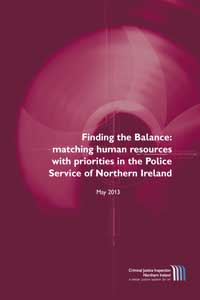
PSNI must take a service-wide approach to allocating staff to meet future policing needs of the community
Criminal Justice Inspection Northern Ireland (CJI) has today (Thursday 9 May 2013) called on the Police Service of Northern Ireland (PSNI) to take steps to better match its workforce to meet the policing needs of the community in years to come.
“Rising community expectations for policing together with increasing challenges around austerity have focused greater attention on how the police plan, manage, allocate and deploy their human resources,” said Brendan McGuigan, Chief Inspector of Criminal Justice in Northern Ireland.
"This is why in this forward-looking report Inspectors have recommended the PSNI should take steps to improve its workforce planning so that existing performance levels can be sustained and improved on in the future."
Mr McGuigan indicated Inspectors had found the current approach to workforce planning within the PSNI was based on the historical allocation of resources.
"We believe the adoption of the demand modelling approach - which matches resources against the projected demands for specific services - which has been used effectively by some police forces the UK and by other public services, would benefit the PSNI."
Mr McGuigan continued: "This approach is already being piloted within policing Districts and we would urge the Police Service to expand its use across the whole of the organisation, so a complete picture of all available resources is obtained in order to best meet future needs."
The Chief Inspector of Criminal Justice in Northern Ireland indicated that by adopting a longer term strategic approach to workforce planning, the PSNI could simultaneously work to address skills gaps within the organisation and introduce clearer succession planning arrangements.
This approach, he said would provide opportunities for staff development and reduce the likelihood of the PSNI again becoming reliant on the use of temporary staff to fulfil immediate skills gaps on a short-term basis.
"It is also imperative that should the PSNI adopt this method of working, it is closely linked to the review of the current People Strategy.
"By doing so, all staff working for the organisation will be able to clearly see how this new approach relates to and will impact on their area of work, so that clarity, understanding and buy-in exists throughout the Service to achieve its goals," said Mr McGuigan.
In the report Inspectors have also highlighted the benefits to be gained by the PSNI through comparing or benchmarking its performance against that of other police forces and indeed other public bodies, to identify good practice and areas for improvement.
"In order for any comparison to be effective, we have recommended the PSNI should first define and categorise its spending on national security issues and other parts of the business which are unique to Northern Ireland such as the policing of a land border and legacy issues," said the Chief Inspector.
In conclusion Mr McGuigan said: "The PSNI has made significant progress since it was established in 2001 and has succeeded in achieving the vast majority of the Patten reform recommendations. This forward looking report is written to help the PSNI move on and to find new solutions to the challenges that lie ahead.
"Our recommendations if fully implemented, will enable the Police Service to better meet current and future demands and satisfy its own staff and stakeholders, that they are doing this in the current economic climate, in an open and transparent way."